省略句用法专项练习
- 格式:doc
- 大小:15.50 KB
- 文档页数:2
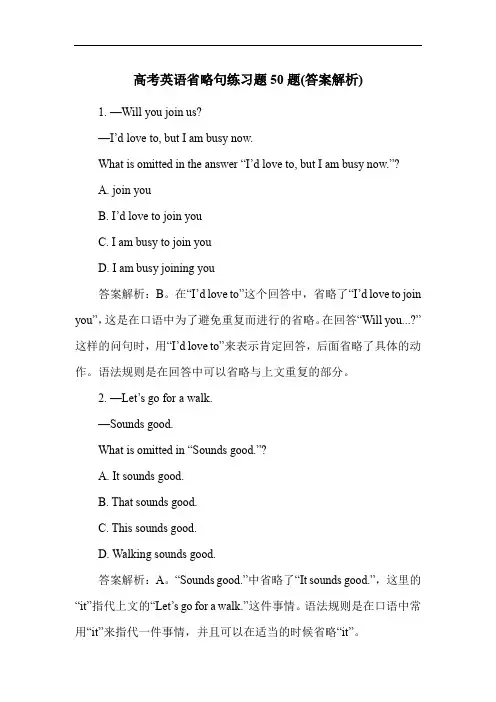
高考英语省略句练习题50题(答案解析)1. —Will you join us?—I’d love to, but I am busy now.What is omitted in the answer “I’d love to, but I am busy now.”?A. join youB. I’d love to join youC. I am busy to join youD. I am busy joining you答案解析:B。
在“I’d love to”这个回答中,省略了“I’d love to join you”,这是在口语中为了避免重复而进行的省略。
在回答“Will you...?”这样的问句时,用“I’d love to”来表示肯定回答,后面省略了具体的动作。
语法规则是在回答中可以省略与上文重复的部分。
2. —Let’s go for a walk.—Sounds good.What is omitted in “Sounds good.”?A. It sounds good.B. That sounds good.C. This sounds good.D. Walking sounds good.答案解析:A。
“Sounds good.”中省略了“It sounds good.”,这里的“it”指代上文的“Let’s go for a walk.”这件事情。
语法规则是在口语中常用“it”来指代一件事情,并且可以在适当的时候省略“it”。
3. —Have a nice day!—You too.What is omitted in “You too.”?A. Have a nice day too.B. You have a nice day too.C. Wish you a nice day too.D. I wish you a nice day too.答案解析:B。
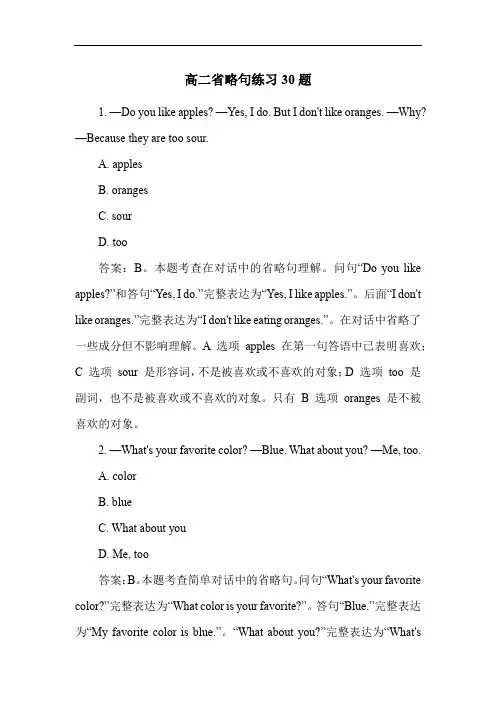
高二省略句练习30题1. —Do you like apples? —Yes, I do. But I don't like oranges. —Why? —Because they are too sour.A. applesB. orangesC. sourD. too答案:B。
本题考查在对话中的省略句理解。
问句“Do you like apples?”和答句“Yes, I do.”完整表达为“Yes, I like apples.”。
后面“I don't like oranges.”完整表达为“I don't like eating oranges.”。
在对话中省略了一些成分但不影响理解。
A 选项apples 在第一句答语中已表明喜欢;C 选项sour 是形容词,不是被喜欢或不喜欢的对象;D 选项too 是副词,也不是被喜欢或不喜欢的对象。
只有B 选项oranges 是不被喜欢的对象。
2. —What's your favorite color? —Blue. What about you? —Me, too.A. colorB. blueC. What about youD. Me, too答案:B。
本题考查简单对话中的省略句。
问句“What's your favorite color?”完整表达为“What color is your favorite?”。
答句“Blue.”完整表达为“My favorite color is blue.”。
“What about you?”完整表达为“What'syour favorite color?”。
“Me, too.”完整表达为“My favorite color is blue, too.”。
A 选项color 是“颜色”的统称,不是具体的颜色;C 选项What about you 是询问对方的句子,不是答案;D 选项Me, too 只是一种简略回答,不是具体的颜色。
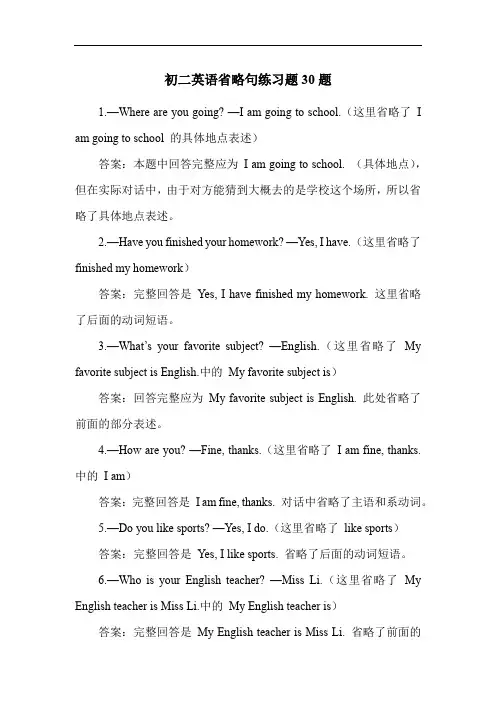
初二英语省略句练习题30题1.—Where are you going? —I am going to school.(这里省略了I am going to school 的具体地点表述)答案:本题中回答完整应为I am going to school. (具体地点),但在实际对话中,由于对方能猜到大概去的是学校这个场所,所以省略了具体地点表述。
2.—Have you finished your homework? —Yes, I have.(这里省略了finished my homework)答案:完整回答是Yes, I have finished my homework. 这里省略了后面的动词短语。
3.—What’s your favorite subject? —English.(这里省略了My favorite subject is English.中的My favorite subject is)答案:回答完整应为My favorite subject is English. 此处省略了前面的部分表述。
4.—How are you? —Fine, thanks.(这里省略了I am fine, thanks.中的I am)答案:完整回答是I am fine, thanks. 对话中省略了主语和系动词。
5.—Do you like sports? —Yes, I do.(这里省略了like sports)答案:完整回答是Yes, I like sports. 省略了后面的动词短语。
6.—Who is your English teacher? —Miss Li.(这里省略了My English teacher is Miss Li.中的My English teacher is)答案:完整回答是My English teacher is Miss Li. 省略了前面的部分。
7.—What time is it? —It’s eight o’clock.(这里省略了It is eight o’clock.中的It is)答案:完整回答是It is eight o’clock. 对话中省略了系动词。
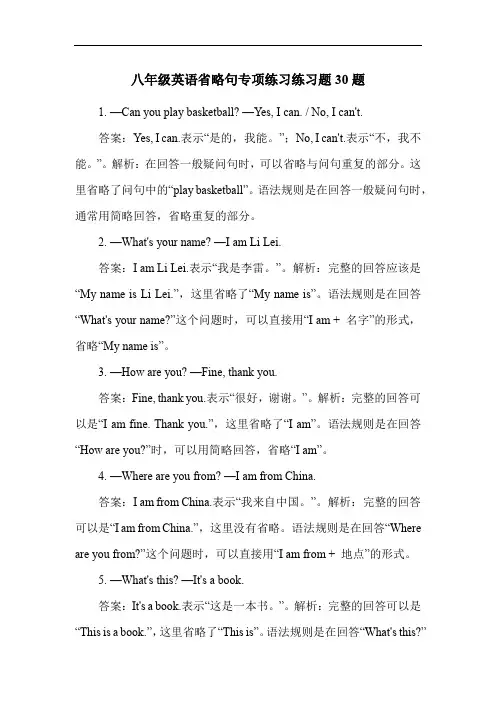
八年级英语省略句专项练习练习题30题1. —Can you play basketball? —Yes, I can. / No, I can't.答案:Yes, I can.表示“是的,我能。
”;No, I can't.表示“不,我不能。
”。
解析:在回答一般疑问句时,可以省略与问句重复的部分。
这里省略了问句中的“play basketball”。
语法规则是在回答一般疑问句时,通常用简略回答,省略重复的部分。
2. —What's your name? —I am Li Lei.答案:I am Li Lei.表示“我是李雷。
”。
解析:完整的回答应该是“My name is Li Lei.”,这里省略了“My name is”。
语法规则是在回答“What's your name?”这个问题时,可以直接用“I am + 名字”的形式,省略“My name is”。
3. —How are you? —Fine, thank you.答案:Fine, thank you.表示“很好,谢谢。
”。
解析:完整的回答可以是“I am fine. Thank you.”,这里省略了“I am”。
语法规则是在回答“How are you?”时,可以用简略回答,省略“I am”。
4. —Where are you from? —I am from China.答案:I am from China.表示“我来自中国。
”。
解析:完整的回答可以是“I am from China.”,这里没有省略。
语法规则是在回答“Where are you from?”这个问题时,可以直接用“I am from + 地点”的形式。
5. —What's this? —It's a book.答案:It's a book.表示“这是一本书。
”。
解析:完整的回答可以是“This is a book.”,这里省略了“This is”。
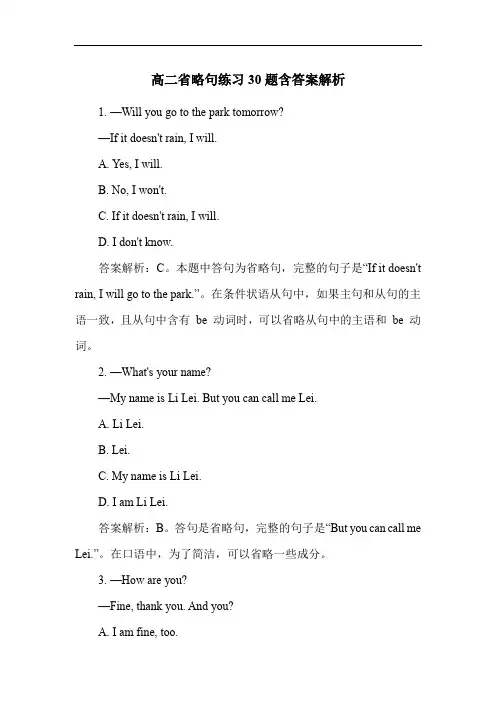
高二省略句练习30题含答案解析1. —Will you go to the park tomorrow?—If it doesn't rain, I will.A. Yes, I will.B. No, I won't.C. If it doesn't rain, I will.D. I don't know.答案解析:C。
本题中答句为省略句,完整的句子是“If it doesn't rain, I will go to the park.”。
在条件状语从句中,如果主句和从句的主语一致,且从句中含有be 动词时,可以省略从句中的主语和be 动词。
2. —What's your name?—My name is Li Lei. But you can call me Lei.A. Li Lei.B. Lei.C. My name is Li Lei.D. I am Li Lei.答案解析:B。
答句是省略句,完整的句子是“But you can call me Lei.”。
在口语中,为了简洁,可以省略一些成分。
3. —How are you?—Fine, thank you. And you?A. I am fine, too.B. Fine.C. Thank you.D. And you?答案解析:A。
答句“And you?”是省略句,完整的句子是“And how are you?”。
在日常对话中,经常使用省略句来使对话更加简洁。
4. —Where are you from?—I am from China.A. China.B. I am from China.C. From China.D. I come from China.答案解析:C。
答句“From China.”是省略句,完整的句子是“I am from China.”。
在回答问题时,可以省略主语和be 动词。
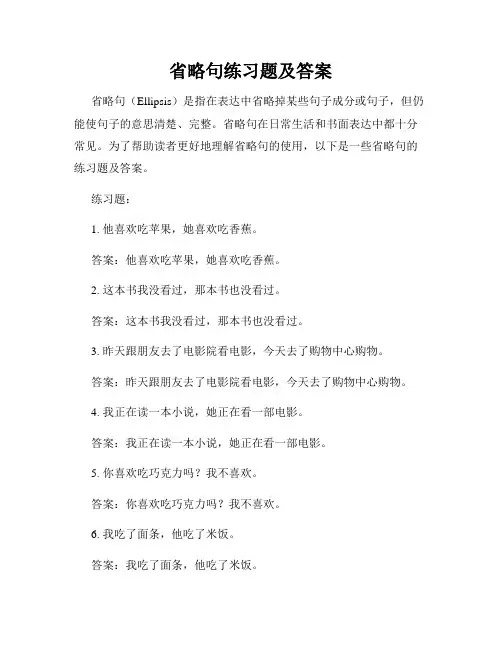
省略句练习题及答案省略句(Ellipsis)是指在表达中省略掉某些句子成分或句子,但仍能使句子的意思清楚、完整。
省略句在日常生活和书面表达中都十分常见。
为了帮助读者更好地理解省略句的使用,以下是一些省略句的练习题及答案。
练习题:1. 他喜欢吃苹果,她喜欢吃香蕉。
答案:他喜欢吃苹果,她喜欢吃香蕉。
2. 这本书我没看过,那本书也没看过。
答案:这本书我没看过,那本书也没看过。
3. 昨天跟朋友去了电影院看电影,今天去了购物中心购物。
答案:昨天跟朋友去了电影院看电影,今天去了购物中心购物。
4. 我正在读一本小说,她正在看一部电影。
答案:我正在读一本小说,她正在看一部电影。
5. 你喜欢吃巧克力吗?我不喜欢。
答案:你喜欢吃巧克力吗?我不喜欢。
6. 我吃了面条,他吃了米饭。
答案:我吃了面条,他吃了米饭。
7. 他喜欢在家看电视,我喜欢出去玩。
答案:他喜欢在家看电视,我喜欢出去玩。
8. 昨天我在图书馆看书,她在咖啡店喝咖啡。
答案:昨天我在图书馆看书,她在咖啡店喝咖啡。
9. 你想喝茶还是咖啡?我想喝咖啡。
答案:你想喝茶还是咖啡?我想喝咖啡。
10. 她是个医生,他是个律师。
答案:她是个医生,他是个律师。
答案解析:以上练习题中,答案部分都是省略掉了重复的句子或句子成分,以保持句意的完整和流畅。
在口语和书面表达中,为了避免重复,省略句是常用的表达方式。
需要注意的是,省略句的使用要在语境清晰、句意明确的前提下进行。
如果省略过度或造成歧义,会给读者带来困惑,影响信息的传达。
因此,在运用省略句时,要注意上下文的连贯性和语境的准确性。
总结:省略句作为一种常见的表达方式,能够简化语言,提高句子的简洁性和流畅性。
通过练习和实践,我们可以更加灵活地运用省略句,以达到更清晰、简洁的表达效果。
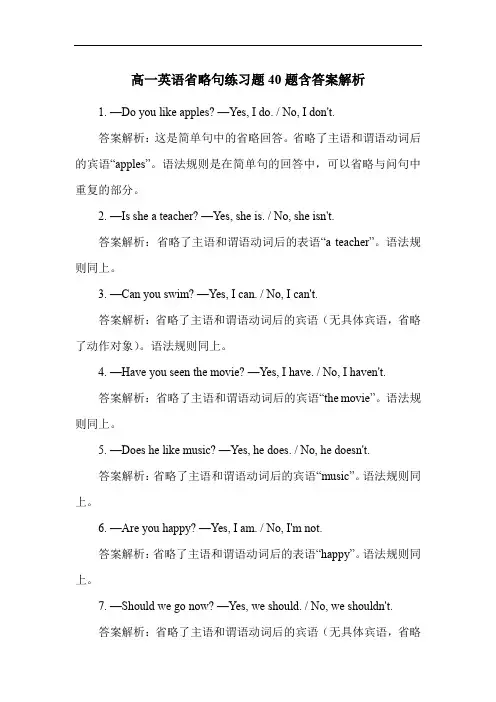
高一英语省略句练习题40题含答案解析1. —Do you like apples? —Yes, I do. / No, I don't.答案解析:这是简单句中的省略回答。
省略了主语和谓语动词后的宾语“apples”。
语法规则是在简单句的回答中,可以省略与问句中重复的部分。
2. —Is she a teacher? —Yes, she is. / No, she isn't.答案解析:省略了主语和谓语动词后的表语“a teacher”。
语法规则同上。
3. —Can you swim? —Yes, I can. / No, I can't.答案解析:省略了主语和谓语动词后的宾语( 无具体宾语,省略了动作对象)。
语法规则同上。
4. —Have you seen the movie? —Yes, I have. / No, I haven't.答案解析:省略了主语和谓语动词后的宾语“the movie”。
语法规则同上。
5. —Does he like music? —Yes, he does. / No, he doesn't.答案解析:省略了主语和谓语动词后的宾语“music”。
语法规则同上。
6. —Are you happy? —Yes, I am. / No, I'm not.答案解析:省略了主语和谓语动词后的表语“happy”。
语法规则同上。
7. —Should we go now? —Yes, we should. / No, we shouldn't.答案解析:省略了主语和谓语动词后的宾语( 无具体宾语,省略了动作对象)。
语法规则同上。
8. —Must I finish the work today? —Yes, you must. / No, you needn't.答案解析:省略了主语和谓语动词后的宾语“the work”和时间状语“today”。
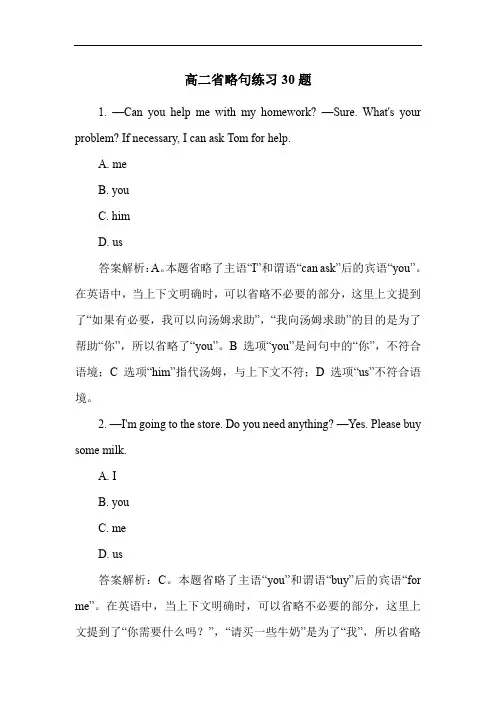
高二省略句练习30题1. —Can you help me with my homework? —Sure. What's your problem? If necessary, I can ask Tom for help.A. meB. youC. himD. us答案解析:A。
本题省略了主语“I”和谓语“can ask”后的宾语“you”。
在英语中,当上下文明确时,可以省略不必要的部分,这里上文提到了“如果有必要,我可以向汤姆求助”,“我向汤姆求助”的目的是为了帮助“你”,所以省略了“you”。
B 选项“you”是问句中的“你”,不符合语境;C 选项“him”指代汤姆,与上下文不符;D 选项“us”不符合语境。
2. —I'm going to the store. Do you need anything? —Yes. Please buy some milk.A. IB. youC. meD. us答案解析:C。
本题省略了主语“you”和谓语“buy”后的宾语“for me”。
在英语中,当上下文明确时,可以省略不必要的部分,这里上文提到了“你需要什么吗?”,“请买一些牛奶”是为了“我”,所以省略了“for me”。
A 选项“I”不符合语境;B 选项“you”是问句中的“你”,不符合语境;D 选项“us”不符合语境。
3. —Have you seen my book? —No. I haven't seen it.A. youB. yourC. yoursD. you're答案解析:C。
本题省略了主语“I”和谓语“haven't seen”后的宾语“your book”。
在英语中,当上下文明确时,可以省略不必要的部分,这里上文提到了“你看到我的书了吗?”,“我没看到它”中的“它”指代“你的书”,所以省略了“your book”。
A 选项“you”是“你”,不符合语境;B 选项“your”是“你的”,后面需要接名词;D 选项“you're”是“you are”的缩写,不符合语境。
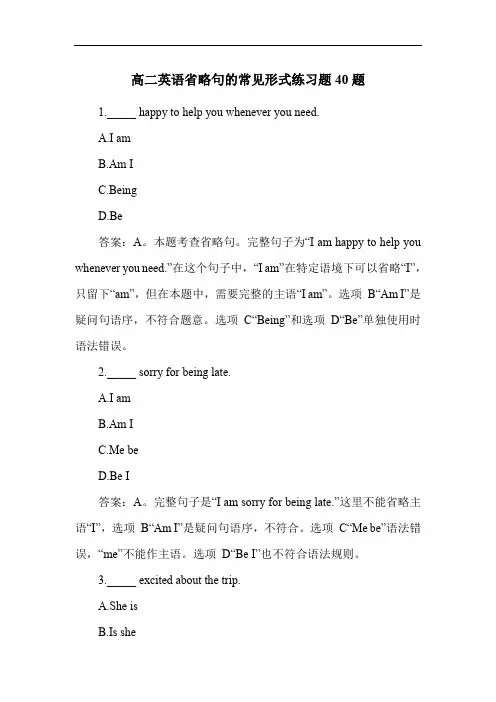
高二英语省略句的常见形式练习题40题1._____ happy to help you whenever you need.A.I amB.Am IC.BeingD.Be答案:A。
本题考查省略句。
完整句子为“I am happy to help you whenever you need.”在这个句子中,“I am”在特定语境下可以省略“I”,只留下“am”,但在本题中,需要完整的主语“I am”。
选项B“Am I”是疑问句语序,不符合题意。
选项C“Being”和选项D“Be”单独使用时语法错误。
2._____ sorry for being late.A.I amB.Am IC.Me beD.Be I答案:A。
完整句子是“I am sorry for being late.”这里不能省略主语“I”,选项B“Am I”是疑问句语序,不符合。
选项C“Me be”语法错误,“me”不能作主语。
选项D“Be I”也不符合语法规则。
3._____ excited about the trip.A.She isB.Is sheD.Be she答案:A。
完整表达为“She is excited about the trip.”不能省略主语“she”,选项B 是疑问句语序,不对。
选项C“Her be”错误,“her”不能作主语。
选项D“Be she”也不对。
4._____ worried about the exam.A.He isB.Is heC.Him beD.Be he答案:A。
“He is worried about the exam.”不能省略主语“he”,选项B 疑问句语序错误,选项C“him”不能作主语,选项D“Be he”错误。
5._____ surprised to see you here.A.We areB.Are we beD.Be we答案:A。
完整句子是“We are surprised to see you here.”不能省略主语“we”,选项 B 是疑问句语序,选项C“us”不能作主语,选项D“Be we”错误。
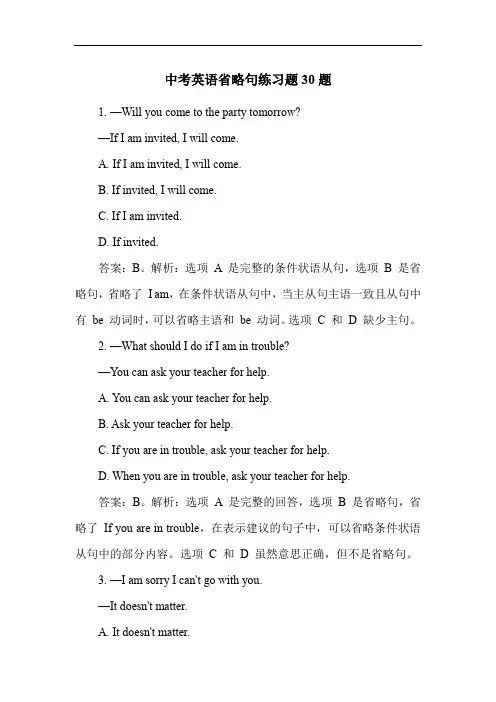
中考英语省略句练习题30题1. —Will you come to the party tomorrow?—If I am invited, I will come.A. If I am invited, I will come.B. If invited, I will come.C. If I am invited.D. If invited.答案:B。
解析:选项 A 是完整的条件状语从句,选项B 是省略句,省略了I am,在条件状语从句中,当主从句主语一致且从句中有be 动词时,可以省略主语和be 动词。
选项C 和D 缺少主句。
2. —What should I do if I am in trouble?—You can ask your teacher for help.A. You can ask your teacher for help.B. Ask your teacher for help.C. If you are in trouble, ask your teacher for help.D. When you are in trouble, ask your teacher for help.答案:B。
解析:选项 A 是完整的回答,选项B 是省略句,省略了If you are in trouble,在表示建议的句子中,可以省略条件状语从句中的部分内容。
选项C 和D 虽然意思正确,但不是省略句。
3. —I am sorry I can't go with you.—It doesn't matter.A. It doesn't matter.B. If you can't go with me, it doesn't matter.C. Because you can't go with me, it doesn't matter.D. When you can't go with me, it doesn't matter.答案:A。
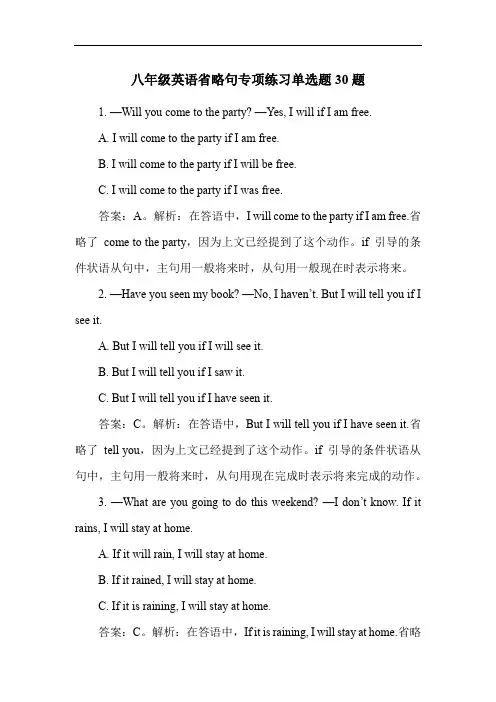
八年级英语省略句专项练习单选题30题1. —Will you come to the party? —Yes, I will if I am free.A. I will come to the party if I am free.B. I will come to the party if I will be free.C. I will come to the party if I was free.答案:A。
解析:在答语中,I will come to the party if I am free.省略了come to the party,因为上文已经提到了这个动作。
if 引导的条件状语从句中,主句用一般将来时,从句用一般现在时表示将来。
2. —Have you seen my book? —No, I haven’t. But I will tell you if I see it.A. But I will tell you if I will see it.B. But I will tell you if I saw it.C. But I will tell you if I have seen it.答案:C。
解析:在答语中,But I will tell you if I have seen it.省略了tell you,因为上文已经提到了这个动作。
if 引导的条件状语从句中,主句用一般将来时,从句用现在完成时表示将来完成的动作。
3. —What are you going to do this weekend? —I don’t know. If it rains, I will stay at home.A. If it will rain, I will stay at home.B. If it rained, I will stay at home.C. If it is raining, I will stay at home.答案:C。
六年级英语省略句练习题40题含答案解析1. —Is your mother at home? —No, she isn't. She's gone to the supermarket.A. she isn't. She's gone to the supermarket.B. she isn't. She has gone to the supermarket.C. she isn't. She went to the supermarket.D. she isn't. She goes to the supermarket.答案解析:B。
在回答中“She's gone to the supermarket.”是“She has gone to the supermarket.”的省略形式。
这里省略了“has”,在口语中经常这样表达。
涉及的语法规则是现在完成时的省略形式。
2. —Do you like apples? —Yes, I do. I like them very much.A. I do. I like them very much.B. I do. I like it very much.C. I do. I like apple very much.D. I do. I like apples very much.答案解析:D。
回答中“I like them very much.”是“I like apples very much.”的省略形式,用“them”指代“apples”。
涉及的语法规则是代词的省略形式。
3. —What's your favorite subject? —English. I think it's interesting.A. English. I think it's interesting.B. English. I think that it's interesting.C. My favorite subject is English. I think it's interesting.D. My favorite subject is English. I think that it's interesting.答案解析:A。
高二英语省略句用法练习题40题1. - I'm going to the library. - _____.A. So do IB. So am IC. So I doD. So I am答案:B。
解析:在这个对话中,上句说“我打算去图书馆”,这里“am going”是进行时态表示将来。
下句表示“我也是”,要用“So + be 动词/助动词/情态动词+ 主语”结构,这里be动词应该是“am”,因为上句的谓语是“am going”,A选项中“do”与原句谓语动词形式不符,C选项“So I do”表示“我确实这样做了”,是对上文的强调,D选项“SoI am”也是强调自己确实是,不符合语境。
2. - He likes playing football. - _____.A. So she doesB. So does sheC. So she likesD. So likes she答案:B。
解析:上句说“他喜欢踢足球”,下句“她也是”,要用“So + 助动词+ 主语”结构,这里原句的谓语动词是“likes”,是一般现在时的第三人称单数形式,助动词是“does”,A选项“So she does”表示“她确实这样”,是强调,C选项“So she likes”这种表达不存在,D选项“So likes she”语序错误。
3. - She can sing very well. - _____.A. So can heB. So he canC. So he doesD. So does he答案:A。
解析:上句说“她唱歌很好”,下句“他也能( 唱得很好)”,要用“So + 情态动词+ 主语”结构,原句中情态动词是“can”,所以要用“can”,B选项“So he can”表示“他确实能”,是强调,C选项“So he does”中的“does”与原句的“can”不符,D选项“So does he”也是因为助动词错误。
高二英语省略句的常见形式练习题50题含答案解析1. —Will you go to the park tomorrow?—If it doesn't rain, I will.A. rainB. rainsC. will rainD. is raining答案解析:A。
本题中“If it doesn't rain”是一个省略句,完整的句子应该是“If it doesn't rain tomorrow”,省略了时间状语“tomorrow”。
在条件状语从句中,如果主从句的主语一致,且谓语动词中含有be 动词,可以将主语和be 动词一起省略。
2. —Who can answer this question?—I can if I know.A. knowB. knowsC. will knowD. am knowing答案解析:A。
“if I know”是省略句,完整的句子是“if I know the answer”,省略了宾语“the answer”。
在条件状语从句中,如果谓语动词是及物动词,且宾语与主句的宾语一致,可以省略宾语。
3. —Let's go for a walk.—Good idea. If it's fine.A. fineB. is fineC. will be fineD. was fine答案解析:B。
“If it's fine”是省略句,完整的句子是“If it is fine today”,省略了时间状语“today”。
在条件状语从句中,如果主从句的主语一致,且谓语动词是be 动词,可以将主语和be 动词一起省略。
4. —Do you need any help?—No, thanks. I can do it myself if necessary.A. necessaryB. is necessaryC. will be necessaryD. was necessary答案解析:B。
高考英语省略句练习题30题1. —I'm going to the park. —______ too.A. I'mB. MeC. MyD. Mine答案解析:B。
“Me too.”是固定表达,表示“我也是”,这里省略了谓语动词“am going to the park”。
A 选项“I'm”后面需要接具体内容,不能单独使用;C 选项“My”是形容词性物主代词,后面需要接名词;D 选项“Mine”是名词性物主代词,也不能单独使用。
2. —I like apples. —______ do I.A. SoB. SuchC. The sameD. As答案解析:A。
“So do I.”表示“我也是”,这里省略了谓语动词“like apples”。
B 选项“Such”不能用于此结构;C 选项“The same”后面需要接介词“as”;D 选项“As”也不能单独用于此结构。
3. —I can't swim. —______ can't I.A. NorB. EitherC. SoD. Neither答案解析:D。
“Neither can I.”表示“我也不能”,这里省略了谓语动词“swim”。
A 选项“Nor”通常放在句首,且后面需要倒装;B 选项“Either”表示“也”时,用于否定句的末尾;C 选项“So”用于肯定句的倒装结构。
4. —I have a book. —______ have I.A. SoB. SuchC. The sameD. As答案解析:A。
“So have I.”表示“我也有”,这里省略了谓语动词“have a book”。
B 选项“Such”不能用于此结构;C 选项“The same”后面需要接介词“as”;D 选项“As”也不能单独用于此结构。
5. —I am happy. —______ am I.A. SoB. SuchC. The sameD. As答案解析:A。
中考英语省略句练习题40题(答案解析)1.—Will you come to the party tomorrow?—If I am invited, I will come.A.Yes, I will.B.No, I won't.C.If I am invited.D.I don't know.答案解析:C。
本题中回答是省略句,完整回答是“If I am invited, I will come to the party tomorrow.”省略了“to the party tomorrow”,在对话中避免重复,当条件状语从句的主语和主句主语一致时,可以省略从句中的主语和be 动词,这里省略了“I am”。
语法规则是在特定语境下为了简洁表达可以省略一些重复的内容。
2.—Do you like apples?—Yes, I do.A.No, I don't.B.I like apples.C.Yes.D.No.答案解析:C。
本题回答是省略句,完整回答是“Yes, I like apples.”省略了“like apples”,在肯定回答中,为了简洁可以省略后面的内容。
语法规则是在不影响理解的情况下可以省略重复部分。
3.—Who is singing?—Mary is.A.John is.B.Lucy is.C.Mary is singing.D.I don't know.答案解析:C。
本题回答是省略句,完整回答是“Mary is singing.”省略了“singing”,在回答问题时,可以省略与问题重复的部分。
语法规则是为了简洁表达可以省略已知信息。
4.—Where are you going?—To the park.A.To school.B.To the zoo.C.To the park.D.I don't know.答案解析:C。
本题回答是省略句,完整回答是“I am going to the park.”省略了“I am going”,在回答地点的问题时,可以省略前面的动词和主语。
初一英语省略句练习题40题含答案解析1. —Where are you going? —I'm going to school.A. /B. to schoolC. to the schoolD. to a school答案解析:A。
选项B“to school”完整形式为“I'm going to school.”,这里是省略了“I'm going”后的回答,符合省略句的用法。
选项 C 和D 中“the”和“a”都是多余的,因为“go to school”是固定搭配,表示去上学。
2. —What's your name? —I'm Li Ming.A. /B. My name is Li Ming.C. This is Li Ming.D. That is Li Ming.答案解析:A。
选项B“My name is Li Ming.”完整形式为“I'm Li Ming. My name is Li Ming.”,这里是省略了“My name is”后的回答,符合省略句的用法。
选项C 和D 不符合语境。
3. —How are you? —I'm fine.A. /B. I am fine.C. Fine.D. I'm very fine.答案解析:A。
选项B“I am fine.”完整形式为“I'm fine. I am fine.”,这里是省略了“I am”后的回答,符合省略句的用法。
选项C“Fine.”也是常见的省略回答。
选项D“I'm very fine.”过于啰嗦。
4. —Nice to meet you! —Nice to meet you, too.A. /B. Me, too.C. I am too.D. I'm also.答案解析:A。
选项B“Me, too.”完整形式为“Nice to meet you! Me, too.”,这里是省略了“Nice to meet you!”后的回答,符合省略句的用法。
省略句用法专项练习2
1、—Lucy,could you please spare me a few minutes?
—____,but I hope "a few minutes" won't turn into a few hours.
A. It doesn't matter
B. That's kind of you
C. I'm afraid not
D. I guess so
2、—Hey,taxi!
—_____
—I want to go to the dentist's.
A. Good morning, sir.
B. Nice to see you, sir.
C. Where to, sir?
D. What are you going to do, sir?
3、The doctor expresses his strong desire that the patient _____ immediately.
A. be operated on
B. operated on
C. was operated on
D. would be operated on
4、When he came back, he found the bag he had ____ over the seat was gone.
A. left to hang
B. left hanging
C. left hung
D. to leave hanging
5、Liu Xiang spoke slowly to the Special Olympic competitors so as to have them____.
A. understand him
B. to be understood
C. be understood
D. to understand him
6、—Are there any English story books for us students in the library?
—There are only a few, ____.
A. if any
B. if have
C. if some
D. if has
7、Francis, ____born in Kentucky, lived and practiced law in Missouri.
A. was
B. he was
C. although
D. but
8、—Does Betty know where her violin is?
—She saw somebody walking off with one, but she doesn't know____.
A. whose
B. it
C. whom
D. which
9、—Aren't you the manager?
—No, and I ____.
A. don't want
B. don't want to
C. don't want to be
D. don't
10、—How are you getting on with your work?
—Oh, I'm sorry. Things aren't going so well as____.
A. plans
B. planning
C. planned
D. to plan
11、—What's the matter with you?
—I didn't pass the test, but I still____.
A. hope so
B. hope to
C. hope it
D. hope that
12、The doctor did what he could ___ the boy, but in vain.
A. save
B. to save
C. saving
D. saved
13、—You look happy today, Mary.
—I like my new dress and Mother ___, too.
A. likes
B. does
C. is
D. do
14、—What happened to the boy? He was making so much noise.
—He wanted to play football, but his mother warned him ____.
A. not
B. to
C. not to
D./
15、____ for your brother, I would not have gone to see Mr. Wang.
A. If it is not
B. Were it not
C. Had it not been
D. If they were not
参考答案:
1-5 DCABA 6-10 ACACC 11-15 BBBCC。